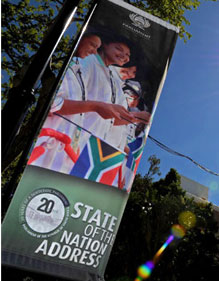
When the president delivers the State of the Nation address in Parliament, what would you like to see on his legislative agenda in respect of anti-corruption programmes?
Yours,
Policy Wonk
Dear Mr Wonk
South Africa has excellent anti-corruption legislation. The Prevention and Combatting of Corrupt Activities Act (Precca) criminalises the full range of corrupt behaviour – from corruption in the executive, legislative and judiciary, to corruption in auctions, sport and gambling. It is supported by a slew of other legislation such as the Prevention of Organised Crime Act and the Protected Disclosures Act.
And, in theory, we have a profusion of independent corruption-fighting units: the Directorate for Priority Crime Investigation (better known as the Hawks), the Special Investigating Unit, the Asset Forfeiture Unit, the Anti-Corruption Task Team, the Public Service Special Anti-Corruption Unit, and the Public Protector. If all these bodies were fully-funded, headed by fearless, independent leaders, and politically supported, the pieces to fight corruption would largely be in place.
The reality is that almost all of these bodies are politically powerless and institutionally incapable. Independent and effective organisations are abolished. Independent leaders are criticised or removed. There is little stomach to deal with high-profile corruption.
Here are a few recent incidents of how the state has stifled these bodies’ fight against corruption: The Scorpions were abolished and replaced with the Hawks, which the Constitutional Court has (twice) found to be insufficiently independent. The head of the Hawks – Anwa Dramat – was unlawfully suspended at the end of last year, for what many believe are spurious reasons.
The head of the SIU – Vas Soni – resigned at least in part because of the pressure of the job. Ever since Thabo Mbeki suspended Vusi Pikoli for investigating corruption allegations against the late Jackie Selebi, the head of the NPA has been constantly under question. Mokotedi Mpshe dropped the corruption charges against President Zuma, who then appointed Menzi Simelane, a decision the Constitutional Court later declared invalid. And the public protector is publicly attacked every time she makes a finding against senior ANC or government officials.
The greatest impediment to preventing corruption is not the law; it is the unwillingness or inability to impartially administer those laws. That is not a problem that can be addressed in the SONA. It requires commitment to the rule of law when comrades and friends are caught stealing public money.
Still, there are some matters on our SONA wish-list:
- The protection currently afforded to whistleblowers is limited to the employment relationship. To encourage people to report corruption, that protection should be expanded beyond the job context.
- Similarly, section 34 of Precca makes it a crime for people in positions of authority not to report corrupt or fraudulent transactions. The provision has not been implemented. It should be enforced.
- The 2014 Public Administration Act establishes the Public Administration Ethics, Integrity and Disciplinary Technical Assistance Unit – a mouthful of a unit that still needs a fearsome animal name. The unit is required to develop norms and standards on integrity, ethics and discipline in the public administration, and build institutions’ capacity to conduct disciplinary proceedings into misconduct. We would like to see a commitment from the president that the unit will be up and running as soon as possible.
- We want the dysfunctional public procurement system reviewed and reformed. The chief procurement officer should be given oversight powers as a first step towards overcoming the acute fragmentation of public procurement that creates opportunities for corruption.
- Government should respond more positively to requests for access to information. Transparency and openness in public affairs should be the norm. But, in practice, secrecy is the state’s default response.
• This article was first published in Sunday Times: Business Times

